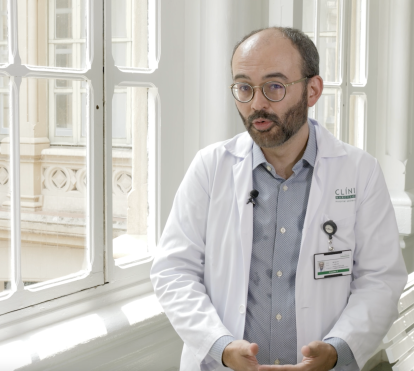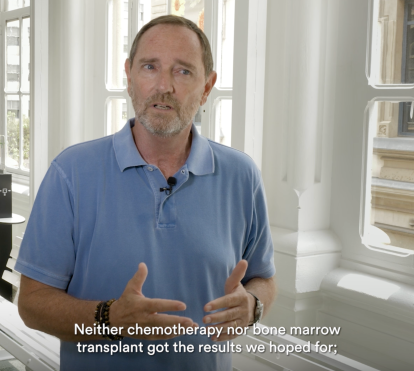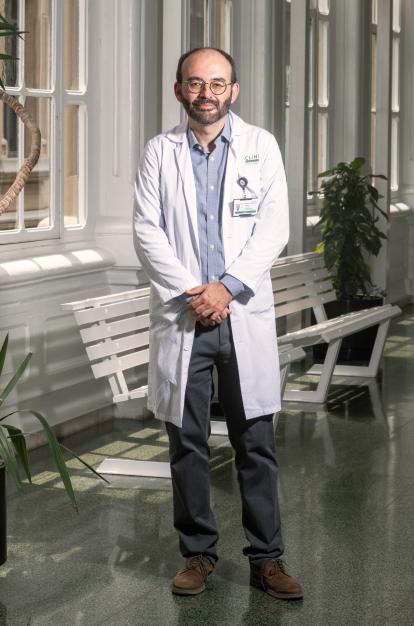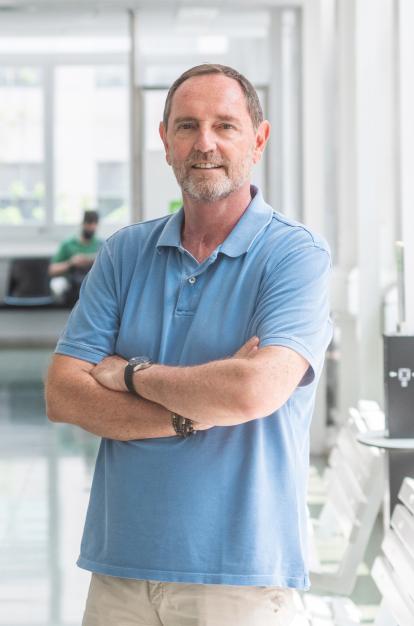
You are reading:

You are reading:

29.04.24
7 minutes readWithout the most common side effects, with improvement from the first days and complete remission after 18 months in almost 70% of cases. A clinical trial of CAR-T therapies coordinated by the Hospital Clínic Barcelona - IDIBAPS, with the support of the ”la Caixa” Foundation, has brought the word curable almost within touching distance for multiple myeloma, the second most common blood cancer in the world, thus increasing hope and quality of life for patients.
“After eight years of unsuccessful treatments, including heavy chemotherapy and a bone marrow transplant, my life has changed dramatically. I’m leading an almost normal life. I no longer have to go to the hospital every week,” says Olivier Jacob, one of 30 multiple myeloma patients who took part in an immunotherapy trial at the Hospital Clínic-IDIBAPS. The study, coordinated by Dr Carlos Fernández de Larrea – haematologist at the hospital and head of the IDIBAPS Myeloma, Amyloidosis, Macroglobulinemia and Other Gammopathies group – falls within the framework of the CaixaResearch Immunotherapy Research Unit, directed by Dr Manel Juan, head of the Immunology Service at the Hospital Clínic-IDIBAPS, and the joint platforms of the Sant Joan de Déu Hospital and the Blood and Tissue Bank.

Olivier remembers the beginning of his illness. “I was tired, I was depressed, it was hard for me to speak. My blood analyses showed that I was very anaemic and I also had a serious kidney problem, which is all a bit strange at the age of 53. I was admitted to the nephrology department and after many tests they discovered multiple myeloma and I was transferred to a myeloma treatment unit,” he says. Neither chemotherapy nor a bone marrow transplant produced the expected results, so they proposed resorting to innovative therapies in the trial phase as the last option to cure his cancer, the patient recounts. “They explained that it would be immunotherapy and not chemotherapy, that if it worked I could have a complete and lasting remission, and that the follow-up would be much easier and without medication. I didn’t hesitate for a moment,” he recalls with conviction.
This treatment, known as CAR-T therapy (T-cell chimeric antigen receptor), aims to achieve the chronification of the cancer that kills plasma cells (the white blood cells responsible for producing the antibodies we need to respond to infections). “In multiple myeloma, these cells lose their control capacity, grow uncontrollably, escape from the immune system and produce the various symptoms and signs of the disease,” clarifies Dr Carlos Fernández de Larrea. The researcher, who admits that the causes of multiple myeloma are still unknown, beyond the fact that it usually affects people over the age of 60, explains in simple terms what the innovative CAR-T treatment involves, which turns the patient into their own donor, “We extract T lymphocytes from the patient’s blood and modify them in the laboratory using cell therapy to make them capable of recognising tumour cells. So when we inject them back into the patient, they target these cells and eliminate them in an exquisite way.”

This is therefore an advanced therapy (cell, gene and immunotherapy at the same time), a pioneer in Europe, with a response far superior to conventional therapies. All the patients responded to the treatment with CAR-T ARI0002h. After 18 months, 67% have a complete response and in the rest the response is partial. In addition, this CAR-T is administered in just two doses over three months, without surgery and, in Dr Juan’s words “makes the patient’s immune system effective again.” After three months, there is almost no residual disease or neurological toxicity in any of the patients, and immunological side effects are mild, thanks in part to the administration schedule. “In my case, I received one dose in March and another in June, and suddenly the nausea, fatigue and malaise were gone,” says Olivier, a patient in remission. “We only observed side effects in the first few days or weeks after treatment,” clarifies Dr Fernández de Larrea.

For now, the use of CAR-T therapies has been approved by the US Food and Drug Administration (FDA) and the European Medicines Agency (EMA) for the treatment of haematological cancers, but Dr Juan is confident that “they will also be used in what we call solid tumours, such as breast and colon cancer.” The future looks bright. The therapy is also proving effective against malignant plasma cells outside the bone marrow, that is, those that have spread to other organs and tissues. “We have achieved a high response rate in this other group of patients, with remissions that are maintained in a similar way to those in patients who do not have tumours outside the bone marrow,” says Dr Fernández de Larrea. On the other hand, the researchers have set themselves the goal of developing second- or third-generation CAR-Ts, which will be able to recognise more types of malignant substances and last much longer in the patient.

“I haven’t been in hospital for months and that’s very important in terms of quality of life and psychologically. We have to listen to the doctors and be optimistic; there’s been tremendous progress in recent years,” the patient explains happily. Dr Fernández de Larrea confirms this, “The life expectancy of people with multiple myeloma has been increasing since the 20th century, when the average survival time was only two to three years. Today, the average is around seven years, with 20% to 30% of cases surviving more than 10 years. The specific impact of CAR-Ts will be seen in about five years, but we’re very hopeful,” he says. “The development of ARI0002h has been one of the greatest professional satisfactions of my career as a haematologist, because it has allowed us to take from the laboratory to the clinic a strategy with a major impact on the quality of life of patients, on the response to the disease and on society by increasing the number of patients who can receive the drug at a lower cost.” All this is thanks to the hard work of his team and other teams at the Clinic and the FRCB-IDIBAPS, as well as other hospitals in Spain, but also to the support of the ”la Caixa” Foundation, which subsidises the work of the Immunotherapy Research Unit – CaixaResearch, based at the Hospital Clínic.
The ”la Caixa” Foundation is also involved in the development of 15 other CAR-T immunotherapy drugs, for example for patients with lymphoblastic leukaemia, breast cancer or glioblastoma, promoted by the Clínic, or the clinical trial against B-cell non-Hodgkin’s lymphoma, carried out by the Institut de Recerca de l’Hospital de la Santa Creu i Sant Pau, IIB Sant Pau. One of these drugs from the Clínic, based on CAR-T immunotherapy, has already been approved by the Spanish Agency of Medicines and Medical Devices and is available to patients throughout Spain. It is the first immunotherapy led by a non-profit academic research organisation to be approved in Spain. It has also been designated by the European Medicines Agency as a priority medicine to be approved as soon as possible at the European level.
To learn more about the support of the ”la Caixa” Foundation to CAR-T therapies at Clínic Barcelona: here.